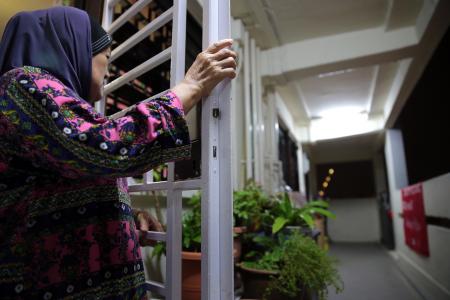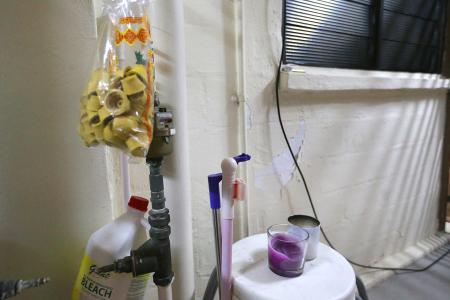Neighbours fight over loud music, 'excessive' cooking
Marine Parade neighbours at loggerheads after clashing and complaining to authorities
For the past two months, elderly couple Madam Himadah Hamid and Mr Hussin Ali have been putting up with loud music blasting from their next door neighbour's flat.
The couple, who live on the 15th storey of Block 15, Marine Terrace, also had to live with the smell of incense floating into their two-room flat.
It is a result of burners the family living next door placed in the common corridor, said Madam Himadah, 64.
She and Mr Hussin, 71, also worried about lit candles that were placed near a stack of cardboard which belongs to their neighbour.
Concerned about the safety and well-being of her parents, the couple's daughter wrote about her parents' predicament in a Facebook post last Wednesday.
As of last evening, the post was shared 702 times and received 165 comments.
The couple, however, complained that they had to put up with the elderly couple's excessive cooking and said they were the real victims.
Relations between the neighbours started souring shortly after the family - a Chinese couple in their 40s and a toddler - moved into the unit beside the elderly couple late last year.
Said Madam Himadah: "We started having problems a few weeks after they moved in. Once, I bumped into the wife at the lift and she made a comment about my house having a smell. She asked me why we cook so much.
"I used to cook for my daughter, son and his five kids. I told her if she really wanted, she could complain to the NEA.".
Some time after the conversation, NEA officers visited her flat to check if they were operating a catering business from their two-room flat.
"They did not find any evidence that I was operating a catering business from home," said Madam Himadah.
After NEA officers visited their home, members from the town council and Residents' Committee (RC) also came by to do checks and to try to mediate.
But the two parties have yet to meet face-to-face for a discussion.
Madam Himadah said: "I don't want to talk to them, because I don't want to quarrel. They also look rather intimidating as they often give us unfriendly stares.".
To celebrate Mother's Day, which fell on May 10, Madam Himadah cooked nasi lemak and fried chicken for a gathering at home.
"We heard them slamming the doors very loudly and someone shouting and cursing," she claimed.
Since April, she said she has stopped cooking on a daily basis, in a bid to appease her neighbours. But relations did not get better. Since April, their neighbour propped a portable radio on a window panel of their own flat.
"It is turned on every day, from morning until they go to bed," Madam Himadah said.
Said their daughter, Madam Hussin, 37: "It is so loud that my dad, who stays at home all day, cannot hear the TV he watches and we cannot hear ourselves having conversations."
When The New Paper visited the flat on Tuesday evening, a scented candle and a tealight was spotted in the corridor. Both were not lit. The radio was no longer there.
This reporter knocked repeatedly on Madam Himadah's neighours' door, but they did not appear to be home.
When approached with queries, public relations manager of Marine Parade Town Council Grace Wong directed TNP to MParader, the official Facebook page for Mr Goh Chok Tong.
DISCOMFORT
He is the MP in charge of Block 15, Marine Terrace. Someone in charge of maintaining the Facebook page wrote in response to a netizen's query over Madam Himadah's case that her neighbour had approached Marine Parade Town Council early this year to help resolve her discomfort with her neighbour's cooking.
"The neighbour is pregnant and has developed some sensitivity to the smells from her neighbour's cooking.
"RC volunteers from Marine Terrace Breeze have been mediating the case. We are grateful to (Madam Himadah) who has been understanding towards her neighbour's sensitivity and very graciously taken the initiative to adjust her cooking routine to minimise the effect on her neighbour.
"The neighbour has in turn taken measures to adjust. Unfortunately the neighbour has in recent weeks also acted on her own accord without the RC's knowledge. The RC volunteers have counselled the neighbour that this does not bode well for neighbourly relations. They will continue to help resolve the issue between both neighbours."
Ms Tin Pei Ling, MP for Marine Parade GRC (MacPherson), said that when faced with disputes between neighbours, she typically refers the issue to the Housing Board for assistance and mediation.
"HDB will often also involve grassroots leaders from the local RC to engage the affected households and attempt to mediate as well," she said.
"However, there are instances where both parties are unwilling to compromise or even engage in a mediation.
"Looking ahead, hopefully with the Community Dispute Resolution Tribunal, such difficult instances can reach a definitive resolution which both parties are obliged to comply with," she added.
Although their neighbours have stopped lighting candles and playing loud music, the elderly couple remain worried.
"It is very stressful to have authorities come and check your home as if you've done something wrong.
"It's also stressful to be at the receiving end of their intimidating looks," said Madam Himadah.
I don't want to talk to them, because I don't want to quarrel. They also look rather intimidating as they often give us unfriendly stares.
- Madam Himadah Hamid
Couple keep windows closed to keep smell out

BUSY: Madam Himadah’s neighbour has filmed her loading large amounts of food on a trolley. PHOTO: TNP READER
Stop playing the victim.
That was what the female neighbour of Madam Himadah Hamid and Mr Hussin Ali had to say to the elderly couple, after the pair had accused her of intimidating them.
"Everyone thinks I'm the bad guy, but no one knows what I'm going through," the neighbour, who declined to be named, told The New Paper.
"I am the real victim."
When TNP visited her home on Wednesday night, she initially refused to open the door, choosing instead to speak to this reporter through a closed window.
But after much convincing, she eventually relented and invited TNP into her two-room flat because she wanted to share her side of the story - one which differed from her next-door neighbour's account.
Her chief complaint?
Madam Himadah's excessive cooking, which she claimed, can last up to 10 hours.
"When I wake up, I am hit by the suffocating fumes of used cooking oil. When I come back home in the evening, I still have to smell it.
The woman's husband, who also declined to be named, added: "Even the clothes we hang at home will reek of the smell."
The couple told TNP that they moved into their flat in September for the sea breeze, but have been forced by the smell to keep their windows shut.
They suspect that their neighbours are cooking for commercial purposes and believe they have the evidence to prove it.
The husband claimed: "I've seen people delivering gas cylinders that are taller than me to their home.
"Why would someone who is only cooking for her family need such a big cylinder?"
He also showed TNP four videos of Madam Himadah loading large containers of food onto a trolley. He had filmed the videos on four separate occasions during December and January.
His wife also rubbished Madam Himadah's claim that the couple had slammed her door and shouted at her for cooking on Mother's Day.
"We were at a Residents' Committee Mother's Day event that day. How could it be us?"
But the woman admitted to the incense burners and scented candles sitting on her window ledge.
She said: "I burn them for myself, not to annoy my neighbour.
"If I don't burn them, how can I get rid of the cooking smell?"
She also readily admitted to blasting loud music from her radio in her neighbours' direction, but said it was merely to give them a taste of their own medicine.
"On some mornings, I get woken up at 6.30am by the sound of their TV," she claimed.
"It's so loud that I can hear all the words even with my doors and windows closed.
"With the radio, at least they'll know how I feel."
The exasperated woman now feels she is close to hitting breaking point.
She said: "Now, I leave my home in the morning and only come back in the evening so that I don't have to deal with my neighbour. It's really unliveable."
She added that she will not rest her case until the situation improves.
"This is my home and I'm going to protect it.
"I won't suffer in silence anymore."
- GODWIN NG
When I wake up, I am hit by the suffocating fumes of used cooking oil. When I come back home in the evening, I still have to smell it.
- The neighbour, who says that her family is the real victim
MORE GOING TO AUTHORITIES TO MEDIATE DISPUTES
Last year, more than half of the cases handled by the Community Mediation Centre (CMC) involved neighours.
Neighbour disputes formed 56 per cent of the 571 cases handled by the CMC last year, or about 320 cases.
This is up slightly from 294 cases in 2013, but still lower than the 400 cases in 2009.
The CMC achieves an overall success rate of about 75 per cent in the cases it mediates, said a spokesman.
More residents are referring disputes to the authorities and fewer confront neighbours directly, according to a Housing Board survey, which is conducted every five years.
In 2013, 9.4 per cent of residents faced issues with their neighbours and went to the authorities, up from 7.4 per cent in 2008. The HDB and Members of Parliament are some of the authorities residents turn to.
A CMC spokesman said: "When issues arise between residents within a community, it is important to try and resolve the dispute in a manner that preserves neighbourly relations.
"Individuals concerned should take responsibility for the issues, speak with each other and try to resolve the issue amicably."
Disputing parties should consider mediation as a means of helping them to reach a win-win, long term solution.
If all attempts to seek a mediated solution have been exhausted, parties may bring their case to the Community Disputes Resolution Tribunals, which will begin operation this year.
The Ministry of Culture, Community and Youth (MCCY) and Ministry of Law are working with the State Courts to set up the tribunals.
While disputing parties could choose to ignore the agreement they signed during community mediation with little consequence in the past, the tribunals can impose court orders on parties to resolve the dispute.
A repeated breach of such orders can result in criminal liability, said a fact sheet from the MCCY.
"The Tribunals will be an avenue of last resort to adjudicate long-standing, difficult community disputes where other efforts at resolution have failed," said MCCY Minister Lawrence Wong in Parliament in March.
- Benita Aw Yeong
Get The New Paper on your phone with the free TNP app. Download from the Apple App Store or Google Play Store now



